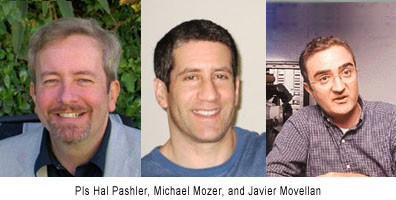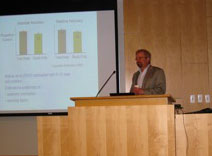The Power of Study and Testing Spacing
The Power of Study and Testing Spacing
The relationships between study and testing have been tackled by many and, as one scientist famously said, “The goal is the most learning from the least study.” Ah but that happy outcome has proven to be elusive.
Several TDLC researchers are on the trail of this core component of a prime Center initiative: “The Temporal Dynamics of the World: How does the relative timing of learning episodes (spacing effects), sequence dependencies within episodes, and feedback influence the effectiveness of learning and duration of memory?”
 The collaborative research team of PIs Hal Pashler (UCSD Psychology Professor) and Michael C. Mozer (U. of Colorado, Boulder Computer Science and Institute of Cognitive Science Professor) and Collaborating PI Javier Movellan (UCSD Institute for Neural Computation Research Scientist) has for the past three years explored the multiple angles of study, testing and learning. In their initial studies they conducted experiments involving learning at educationally relevant time scales. Here subjects studied material over a period of weeks to months and were tested up to a year later, and it was found that spacing has even more impact in these extended time scales than in the more commonly used range of minutes or hours. Significantly, the benefits of timing reviews appropriately held up in translation into a UCSD Preuss School eighth grade class studying U.S. history.
The collaborative research team of PIs Hal Pashler (UCSD Psychology Professor) and Michael C. Mozer (U. of Colorado, Boulder Computer Science and Institute of Cognitive Science Professor) and Collaborating PI Javier Movellan (UCSD Institute for Neural Computation Research Scientist) has for the past three years explored the multiple angles of study, testing and learning. In their initial studies they conducted experiments involving learning at educationally relevant time scales. Here subjects studied material over a period of weeks to months and were tested up to a year later, and it was found that spacing has even more impact in these extended time scales than in the more commonly used range of minutes or hours. Significantly, the benefits of timing reviews appropriately held up in translation into a UCSD Preuss School eighth grade class studying U.S. history.
Based on their empirical findings about long-term spacing, the team has developed a new model of spacing effects called the Multiscale Context Model (MCM). Now they could make reliable predictions of how well an individual would remember a set of facts after studying the material over multiple sessions, spaced according to a particular schedule. These findings broadened the understanding of the mechanisms of memory and are paving the way to development of practical techniques for toward better recall of facts or events (human declarative memory).
The team is also developing a tutoring website, the Colorado Optimized Learning Tutor (COLT), which is currently in use in advanced business Spanish courses at the University of Colorado. As the website tells prospective users, “While a student studies vocabulary, our algorithms are studying the student! The more time a student spends on our system, the better our algorithms are able to choose when and which vocabulary pairs should be studied.”
 Soon on tap is a controlled experiment in which half the items to be learned are scheduled by a default algorithm and the other half are scheduled by MCM’s estimate of which item would most benefit from further study. And, at a recent Educators Network meeting Dr. Pashler encapsulated some notable study/test/learning findings for a rapt audience of San Diego K-12 educators:
Soon on tap is a controlled experiment in which half the items to be learned are scheduled by a default algorithm and the other half are scheduled by MCM’s estimate of which item would most benefit from further study. And, at a recent Educators Network meeting Dr. Pashler encapsulated some notable study/test/learning findings for a rapt audience of San Diego K-12 educators:
- Retention of material over time is much better if testing directly follows studying.
- Memory retrieval enhances learning even if the material is recalled only in one’s head without verbal or written response.
- Multiple choice tests are good for assessment but are less effective in promoting learning than are tests that require the learner to recall information.
- It is important to provide the learner with corrective feedback after errors, but the promptness of this feedback is less critical than some researchers (such as the behaviorist B. F. Skinner) have assumed.
- False guesses on a test (such as foreign language pronunciation) seem to have no harmful effects if they are followed by feedback.
- Learning of non-verbal material, such as a map or an anatomical diagram can be enhanced by a sequence that:
1. Shows the learner the diagram with one element deleted.
2. Challenges the learner to form a mental image of the missing ingredient.
3. Provides corrective feedback.
4. Repeats the process.
For more information on the team’s findings and recommendations for effective learning, see the following papers:
Carpenter, S.K., Pashler, H., Wixted, J.T., & Vul, E. (2008) The effects of tests on learning and forgetting. Mem Cognit Mar;36(2):438-48
Mozer, M. C., Pashler, H., Cepeda, N., Lindsey, R., & Vul, E. (2009). Predicting the optimal spacing of study: A multiscale context model of memory. Advances in Neural Information Processing Systems 22. D.S.Y. Bengio, J. Lafferty, C.K.I. Williams, & A. Culotta. La Jolla, CA: 1321-1329.
Cepeda, N., Coburn, N., Rohrer, D., Wixted, J., Mozer, M., & Pashler, H, (2009). Optimizing distributed practice: Theoretical analysis and practical implications. Experimental Psychology, 56, 236-246.
Rohrer, D. & Pashler, H. (2010). Recent research on human learning challenges Conventional instructional strategies, Educational Researcher (in press). Educational Researcher , 39, 406-412.
![]() by Carolan Gladden
by Carolan Gladden